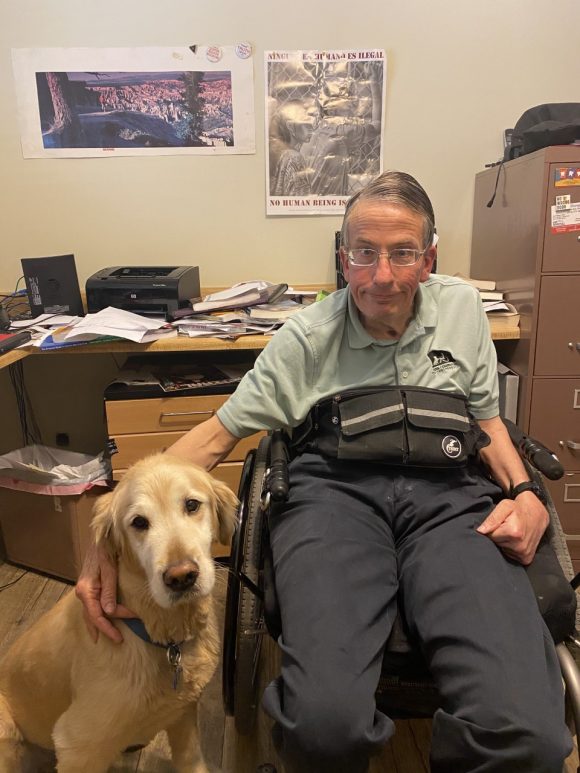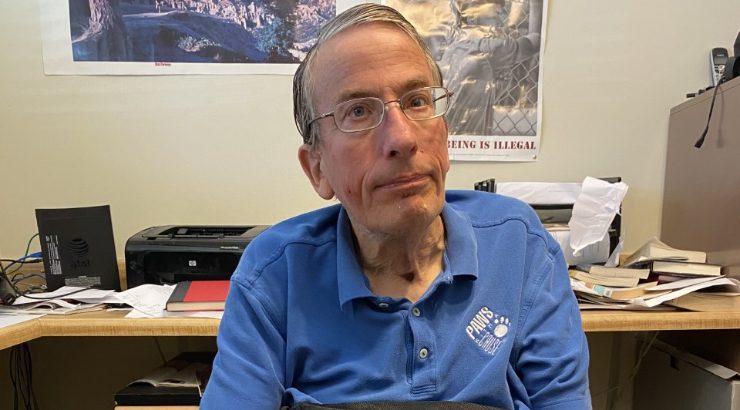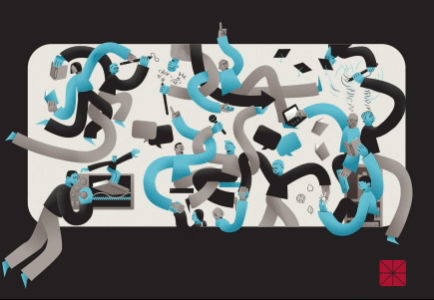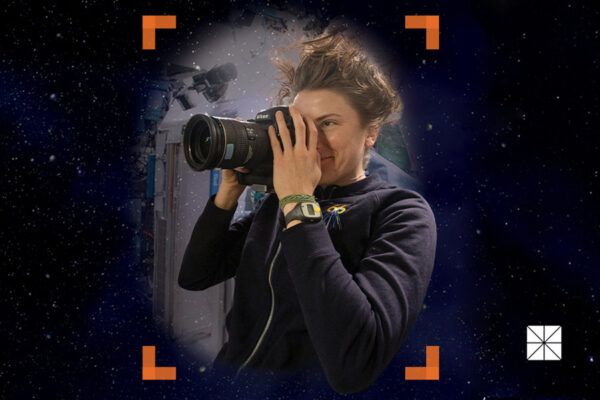Chapman University professor Art Blaser, Ph.D. has picked a serene painting of a blossoming cherry tree as his Zoom background. Nearby offscreen, his assistance canine companion’s collar jingles. It’s a bucolic screen scene, but his topic in this moment is not so easy going — the state of disability representation and inclusion in access, before and during the coronavirus crisis.
COVID-19 has highlighted inequity across the board, but also poses unique problems for individuals with disabilities. Blaser provides a perspective on current events and improvements in accessibility as an expert voice in the field, and also as a person who lives with disabilities. Blaser has been partially paralyzed since 1993 from a chiropractic accident and resultant stroke, and uses a wheelchair.
“I often hear people say, ‘Oh I couldn’t live like that,’” says Blaser. “But really, most people could. And the reality is that disabled people do, and live good lives.”
With much of the world working and studying through remote technology, accessibility is an increasingly universal need. While this may spur improvements in some areas, it is also revealing gaps in equity, Blaser says.
His research and teaching focus on disability studies, human rights, and international non-governmental organizations. He is also the faculty co-chair of the Advisory Group on the Status of Disability & Accessibility.
On balance, Chapman is doing well at addressing disability issues, he says. The university offers a disability studies minor and education graduate program in disability studies but, like most universities, needs more disabled voices representing the disability community, partly because it’s such a diverse group, Blaser says. This is something he aims to help make a bigger priority at Chapman.
“The work has already begun,” says Blaser.
Representation and Access
“The best way to continue is greater representation in recruitment at all levels, in all colleges, recognizing interdisciplinarity. It’s intent, recognition – it counts for something. Also, building closer involvement with the disability community and related organizations,” Blaser says.

Right now, the entire world is in need of exception and accommodation, but also looks to a time when normal routines and systems will return. A request for access, however, is an ongoing fact of life for people who function daily with disabilities.
It’s important for all institutions, from employers to schools, to fulfill these needs not as favors but as rightful treatment, Blaser says.
“If done properly, in most cases, it will be interactive and tailored to the individual, with the realization that the accommodation is a matter of rights, rather than of charity,” said Blaser. “But too often it’s been based on dated stereotypes of how best to protect the disabled person.”
Advocacy, Inclusion and Empathy
That’s where active engagement comes in. At Chapman, Blaser is a key voice in making sure the needs of disabled persons are given the kind of acute and inclusive attention needed to make sure progress is a continual project. His areas of teaching and research focus on the larger picture of human rights and disability intersection, but even at a wide-angle lens perspective it still comes down to the basics of consideration and inclusion.
A Need to Lead the Conversation
It’s a goal that connects with a worldwide trend, says Blaser.
“There are a lot of disabled persons’ organizations, but also on a larger scale there’s the Convention on the Rights of Persons with Disabilities (CRPD) within the United Nations.There are a lot of disability rights movements”
Blaser cites the Convention on the Rights of the Child as a massive turning point in how people interact with representation and disability-linked issues. Children, such as Malala Yousafzai and Greta Thunberg, are now rights-holders and advocates on issues like climate change, child labor and gun violence, changing how we think of children’s’ issues.
“That’s similar to many other minority rights’ issues before that, and now to disability rights issues,” says Blaser. “With COVID-19, knowing that the ‘experts’ will undervalue life with a disability, activists need a seat at the table.”
At each juncture, from the campus to the international arena, there is a common thread: An approach with compassion. A lack of self-centeredness. A commitment to recognizing quality not just in life, but in the value that people with disabilities contribute and add to society.
Throughout it all, Blaser says, “There needs to be empathy.”




